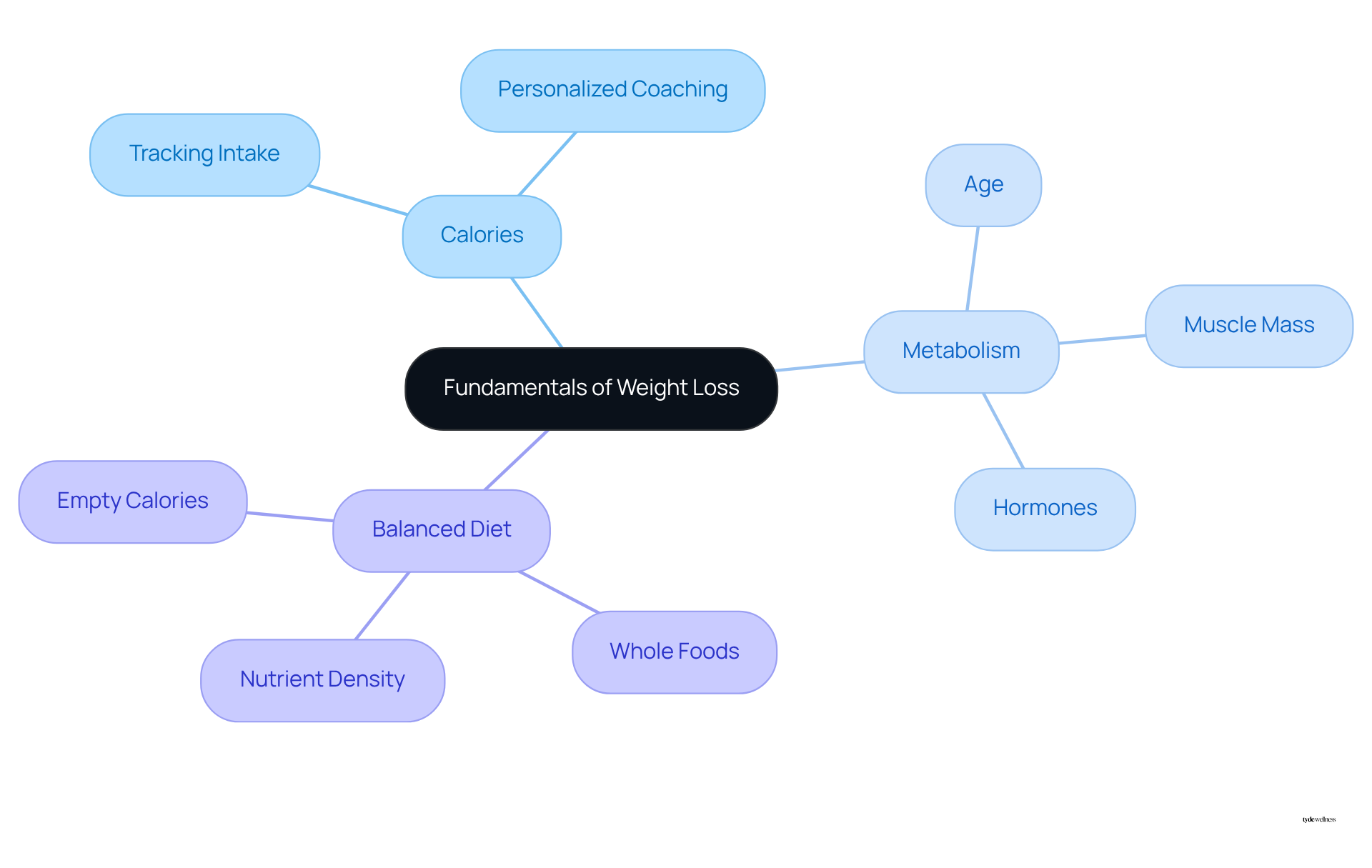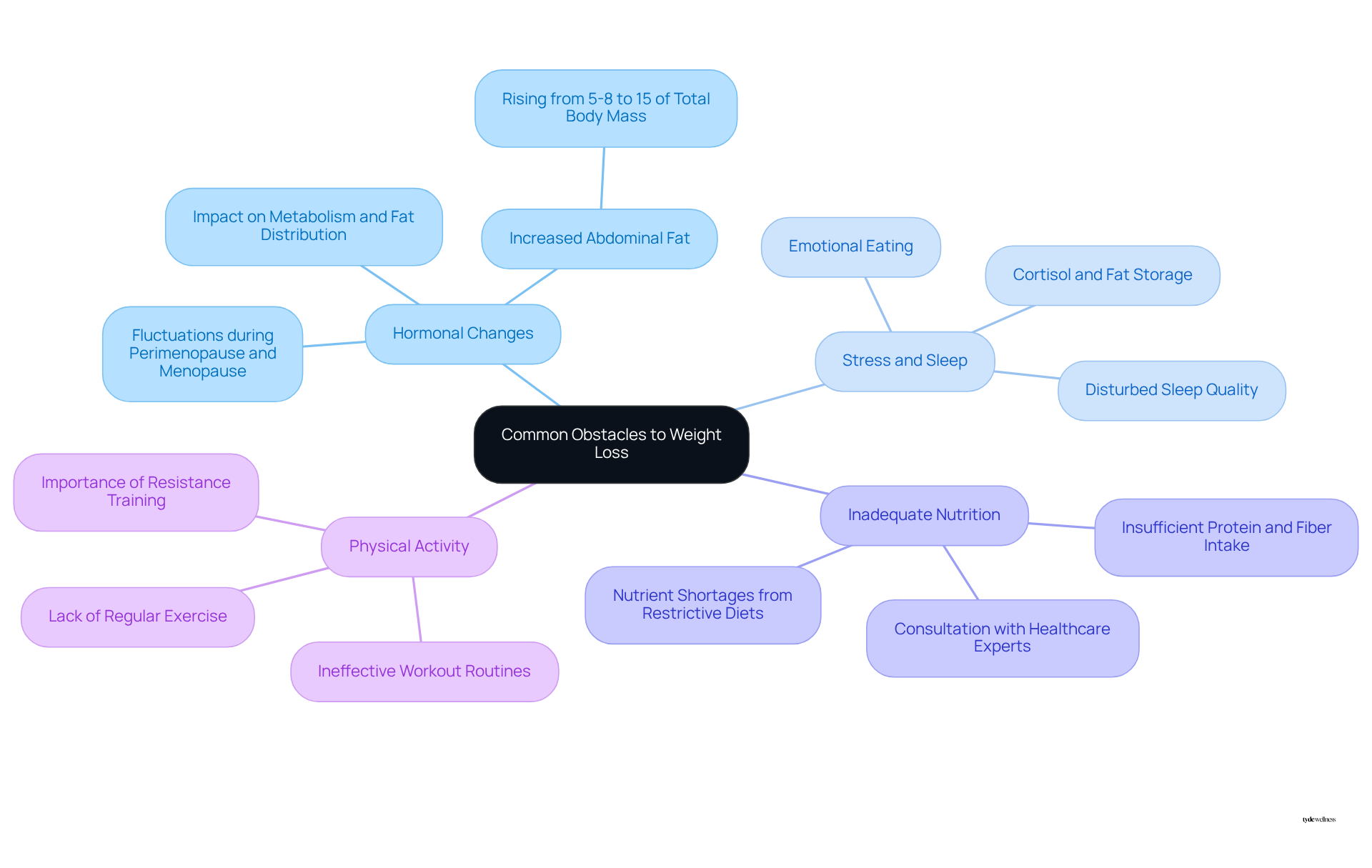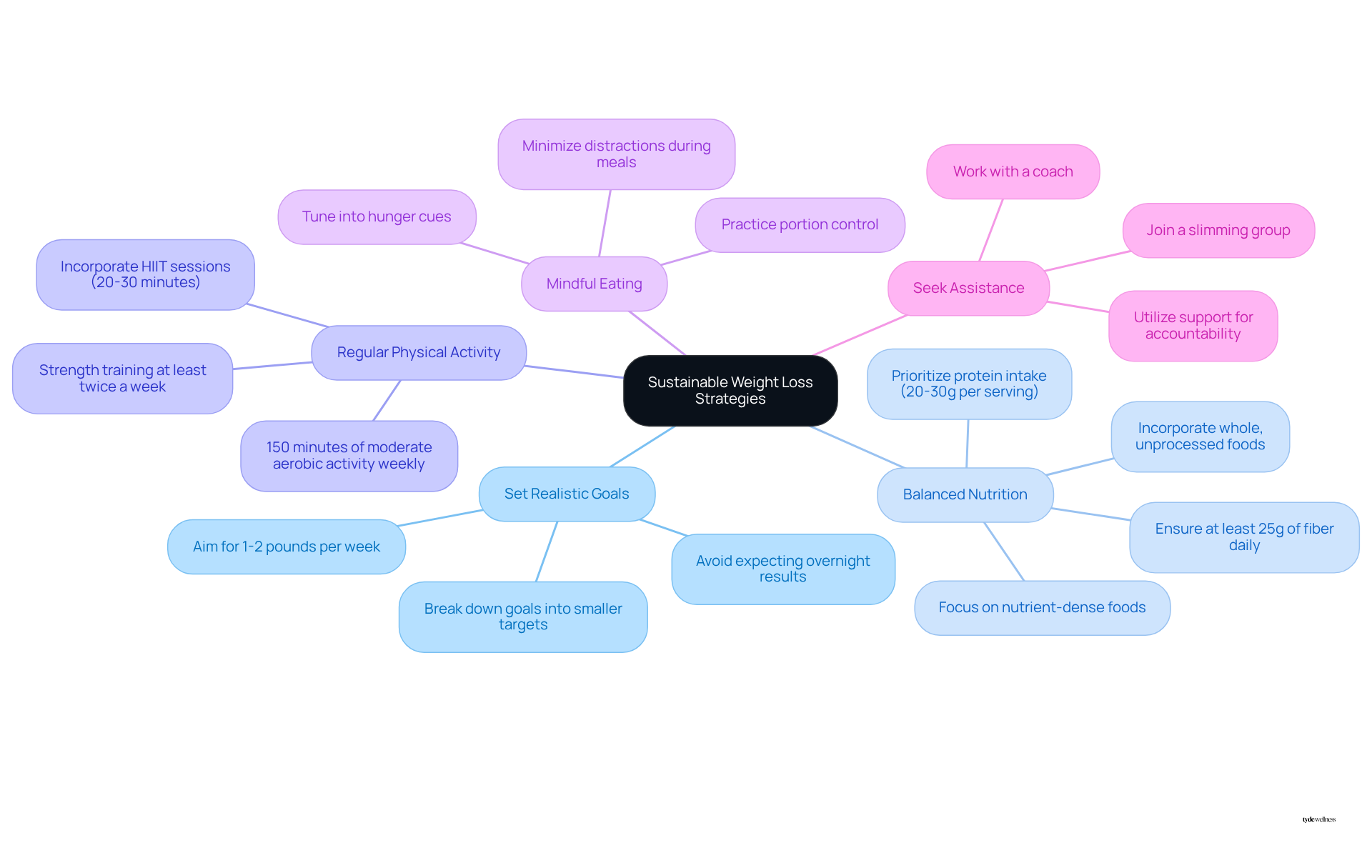Overview
Women may encounter the challenge of working out without significant weight loss due to various factors, including hormonal changes, inadequate nutrition, and stress. These elements can complicate their weight loss efforts. Understanding these obstacles is crucial. By implementing strategies such as:
- Balanced nutrition
- Realistic goal-setting
- Regular physical activity
women can effectively address these challenges. This approach not only aids in overcoming barriers but also promotes sustainable weight loss.
Introduction
Understanding why women often find themselves exercising diligently yet not seeing the desired weight loss can be a perplexing journey. The interplay of metabolism, hormonal changes, and dietary habits creates a complex landscape that can hinder progress. This article delves into the core reasons behind this phenomenon, offering insights and strategies to empower women in their weight loss endeavors. What if the key to overcoming these challenges lies not just in the workout routine, but in a deeper understanding of their unique physiological and psychological hurdles?
Explore the Fundamentals of Weight Loss
Weight reduction fundamentally revolves around the concept of energy equilibrium, which represents the relationship between energy intake and energy expenditure. To achieve weight loss, an individual must create an energy deficit, which can be challenging when working out and not losing weight, meaning they consume fewer calories than they burn. The key components of this process include:
- Calories: Every food and drink contains calories, which are essential for energy required by the body. Effectively tracking and managing calorie intake is crucial, and personalized coaching support from Tyde Wellness can assist individuals who are struggling with working out and not losing weight in navigating this process successfully.
- Metabolism: This refers to the body’s process of converting food into energy. Factors such as age, muscle mass, and hormonal changes can significantly influence metabolic rate, especially for individuals experiencing transitions like menopause.
- Balanced Diet: A diet rich in whole foods—including fruits, vegetables, lean proteins, and whole grains—promotes overall health and aids in body mass reduction. It is vital to prioritize nutrient-dense foods over empty calories, which provide minimal nutritional value, such as sugary snacks and processed items.
By grasping these fundamentals, women can more effectively manage their journeys toward a healthier body, particularly during transitional life phases that may complicate these processes. Research indicates that participants in the Tyde Wellness program can achieve substantial weight loss, often exceeding 20-25% within a year, even when they experience working out and not losing weight, by adhering to structured programs that emphasize calorie deficit and balanced nutrition. As Dr. Dariush Mozaffarian states, “It’s 100% the diet,” underscoring the critical role of nutrition in the effective management of body mass. This holistic approach not only aids in body management but also enhances overall quality of life.

Identify Common Obstacles to Weight Loss
Several common obstacles can impede weight loss efforts for women:
-
Hormonal Changes: Fluctuations in hormones during perimenopause and menopause can significantly impact weight management. These changes often result in increased mass and challenges in reducing mass due to modifications in metabolism and fat distribution. Notably, abdominal fat can rise from approximately 5-8% to as high as 15% of total body mass during this transition.
-
Stress and Sleep: Increased stress levels can lead to emotional eating and disturb sleep quality, both of which negatively impact weight loss. Stress hormones, particularly cortisol, are recognized to encourage fat storage, complicating management efforts. Furthermore, studies show that better sleep can promote healthier lifestyle adjustments, assisting in maintaining a healthy body.
-
Inadequate Nutrition: Many women struggle to consume sufficient protein and fiber, which are essential for promoting satiety and maintaining muscle mass. Restrictive diets can lead to nutrient shortages and heightened cravings, making it more challenging to adhere to a weight reduction plan. Consulting healthcare experts can provide important advice on nutrition tailored to hormonal changes, as insufficient nutrition can exacerbate challenges related to weight loss.
-
Physical Activity: A lack of regular exercise or ineffective workout routines can result in working out and not losing weight. It is crucial to strike a balance between cardiovascular activities and strength training, as building lean muscle through resistance exercises enhances fat-burning efficiency.
By recognizing these challenges, individuals can develop focused strategies to overcome them, thereby improving their journey towards fitness despite working out and not losing weight, and enhancing their overall quality of life.

Implement Effective Strategies for Sustainable Weight Loss
To achieve sustainable weight loss, women can implement several effective strategies:
-
Set Realistic Goals: Establish achievable weight loss targets that focus on gradual progress. Aim for a healthy rate of 1-2 pounds per week, which is considered both sustainable and effective. As Dr. Decotiis advises, make realistic goals that are attainable and avoid expecting to see results overnight.
-
Balanced Nutrition: Incorporate a variety of whole, unprocessed foods into your diet. Prioritize protein intake of 20-30 grams per serving and ensure at least 25 grams of fiber daily to enhance satiety and support muscle mass. Notably, 95% of Americans aren’t consuming sufficient fiber, making it essential for effective management of body mass.
-
Regular Physical Activity: Aim for at least 150 minutes of moderate aerobic activity each week, complemented by strength training exercises at least twice a week. This combination aids in enhancing metabolism and preserving muscle mass, which is crucial for efficient management of body composition, particularly when working out and not losing weight.
-
Mindful Eating: Practice mindful eating by tuning into hunger cues and minimizing distractions during meals. This approach can prevent overeating and foster a healthier relationship with food.
-
Seek Assistance: Consider joining a slimming group or working with a coach who understands the unique challenges women face. Research indicates that receiving support from others can significantly enhance efforts to reduce mass, providing the accountability and encouragement essential for sustained success.
Furthermore, aim for 7-9 hours of sleep each night to support recovery and overall health. By adopting these strategies, women can create a sustainable weight loss plan that aligns with their lifestyle and effectively addresses their specific challenges, particularly when they are working out and not losing weight.

Conclusion
Understanding the complexities of weight loss, particularly for women, is essential in navigating the often frustrating experience of putting in effort at the gym without seeing desired results. The interplay between calorie intake, metabolism, and a balanced diet highlights the importance of a holistic approach to weight management. Recognizing that weight loss is not solely about exercise but also about nutrition and lifestyle choices can empower women to take control of their health journeys.
Throughout the article, key obstacles such as hormonal changes, stress, inadequate nutrition, and ineffective workout routines have been identified as significant barriers to weight loss. By addressing these challenges with tailored strategies—like setting realistic goals, prioritizing balanced nutrition, and incorporating regular physical activity—women can break through plateaus and achieve sustainable results. Moreover, the emphasis on seeking support through coaching or community reinforces the idea that collaboration can enhance individual efforts.
Ultimately, the path to effective weight loss is multifaceted, requiring an understanding of personal circumstances and a commitment to healthy practices. By embracing a comprehensive approach that includes mindful eating, adequate rest, and social support, women can not only overcome the hurdles of working out without losing weight but also foster a healthier, more fulfilling lifestyle. Taking action today can lead to lasting changes that enhance both physical health and overall well-being.
Frequently Asked Questions
What is the fundamental concept behind weight loss?
Weight loss fundamentally revolves around the concept of energy equilibrium, which is the relationship between energy intake and energy expenditure. To lose weight, an individual must create an energy deficit by consuming fewer calories than they burn.
Why is tracking calorie intake important for weight loss?
Tracking calorie intake is crucial because every food and drink contains calories that provide energy for the body. Managing these calories effectively helps individuals create the necessary energy deficit for weight loss.
How does metabolism affect weight loss?
Metabolism is the process by which the body converts food into energy. Factors such as age, muscle mass, and hormonal changes can significantly influence metabolic rate, which can be particularly relevant for individuals experiencing transitions like menopause.
What constitutes a balanced diet for weight loss?
A balanced diet for weight loss should include whole foods such as fruits, vegetables, lean proteins, and whole grains. Prioritizing nutrient-dense foods over empty calories, like sugary snacks and processed items, is essential for promoting overall health and aiding in body mass reduction.
How can Tyde Wellness assist individuals struggling with weight loss?
Tyde Wellness offers personalized coaching support to help individuals navigate the challenges of weight loss, particularly when they are working out but not seeing results. Their structured programs emphasize achieving a calorie deficit and maintaining balanced nutrition.
What results can participants expect from the Tyde Wellness program?
Research indicates that participants in the Tyde Wellness program can achieve substantial weight loss, often exceeding 20-25% within a year, even if they experience challenges like working out and not losing weight.
What role does nutrition play in weight management?
Nutrition plays a critical role in effective weight management, as emphasized by Dr. Dariush Mozaffarian, who states, “It’s 100% the diet.” A holistic approach to nutrition not only aids in body management but also enhances overall quality of life.
List of Sources
- Explore the Fundamentals of Weight Loss
- Intestinal hormone accelerates fat burning and promotes weight loss in obese mice (https://medicalxpress.com/news/2025-06-intestinal-hormone-fat-weight-loss.html)
- You can’t outrun a bad diet. Food — not lack of exercise — fuels obesity, study finds (https://npr.org/2025/07/24/nx-s1-5477662/diet-exercise-obesity-nutrition)
- Energy expenditure and obesity across the economic spectrum | PNAS (https://pnas.org/doi/10.1073/pnas.2420902122)
- Midlife weight loss linked to longer, healthier lives (https://sciencedaily.com/releases/2025/05/250528132109.htm)
- Active but still gaining weight? Duke scientists reveal why (https://sciencedaily.com/releases/2025/07/250720034023.htm)
- Identify Common Obstacles to Weight Loss
- Can Combining GLP-1s and Hormone Therapy Boost Weight Loss? A New Study Shows Significant Results (https://oprahdaily.com/life/health/a65476576/hormone-therapy-glp-1-menopause-weight-loss-study)
- Combination of obesity medication tirzepatide and menopause hormone therapy fuels weight loss (https://endocrine.org/news-and-advocacy/news-room/endo-annual-meeting/endo-2025-press-releases/castaneda-press-release)
- Hormone therapy supercharges tirzepatide, unleashing major weight loss after menopause (https://sciencedaily.com/releases/2025/07/250713031441.htm)
- Is It Harder for Women to Lose Weight? Yes, Here’s Why – GoodRx (https://goodrx.com/conditions/weight-loss/is-it-harder-for-women?srsltid=AfmBOoqtloiVjtb1EhugP-wSfhKSG1sUU7j2CfIU_rGv9Grc4Z6Q7uOw)
- Weight loss drugs could be a gamechanger for women with a common hormonal disorder (https://cnbc.com/2025/07/20/weight-loss-drugs-could-help-treat-pcos.html)
- Implement Effective Strategies for Sustainable Weight Loss
- Top Weight Loss Doctor Shares What to Do Differently in 2025 (https://theeverygirl.com/sue-decotiis-weight-loss-tips)
- 5 steps to sustainable weight loss (https://bhf.org.uk/informationsupport/heart-matters-magazine/nutrition/weight/steps-to-sustainable-weight-loss)
- 5 New Rules To Revolutionize Your Weight Loss Strategy in 2025 – Muscle & Fitness (https://muscleandfitness.com/muscle-fitness-hers/hers-features/5-new-rules-to-revolutionize-your-weight-loss-strategy-in-2025)
- 40+ Weight Loss Statistics 2021 (https://runrepeat.com/weight-loss-statistics)
- Setting Realistic Goals that are Attainable and Keep You Motivated in 2025 (https://garnethealth.org/news/setting-realistic-goals-are-attainable-and-keep-you-motivated-2025)



